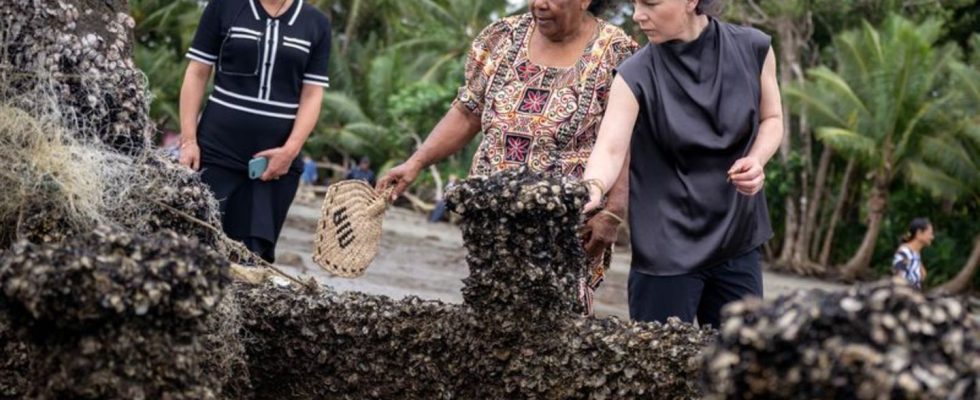Indo-Pacific
“Brutality” of the climate crisis: Baerbock visits Fiji
The focus of Foreign Minister Baerbock’s week-long trip to Australia, New Zealand and Fiji is security policy and climate protection. photo
© Sina Schuldt/dpa
Rising sea levels due to climate change are causing entire villages in the South Pacific to sink. And soon perhaps even entire islands that are still inhabited today – if no countermeasures are taken.
Now only two families live on the beach and they have to fear for their homes. The remains of a Christian cemetery can still be seen in the sea, which can only be reached on foot at low tide. “It is places like these coastal villages in the Pacific that show us the brutality with which the climate crisis strikes,” said Baerbock.
“The climate crisis means for small island states in the Pacific: fields salted, the homeland sunk into the sea and an entire cemetery submerged in salt water, the gravestones now as memorials in the floods.” This shows that the island states in the South Pacific are “literally up to their necks in water”.
Everything must be done to ensure that global warming is limited to 1.5 degrees so that all island states do not sink into the sea at some point. “This is the responsibility of industrialized countries in particular.” Baerbock pointed out that the G20 group of major economic powers is responsible for 80 percent of the emissions of climate-damaging gases.
Severely affected by the consequences of climate change
Fiji is one of the 14 island states in the South Pacific that, although they have a negligible share of global CO2 emissions, are all the more affected by the consequences of climate change and their existence is sometimes threatened. The more than 1,000 Marshall Islands, for example, most of whose land area is barely more than two meters above sea level, could sink into the Pacific Ocean in just a few decades if global warming continues to melt the polar ice unchecked.
According to an assessment report by the Intergovernmental Panel on Climate Change (IPPC) last year, the average global sea level has risen by 20 centimeters since the beginning of the 20th century. During this time, the rate of increase has almost tripled from 1.3 to 3.7 millimeters per year. Extreme weather phenomena such as increasing tropical storms, droughts and heavy rain are making the situation worse.
Yesterday Baerbock had already visited a village in the interior of the main island of Fiji, which is threatened by river flooding and land erosion. This afternoon she is traveling back towards Berlin.

